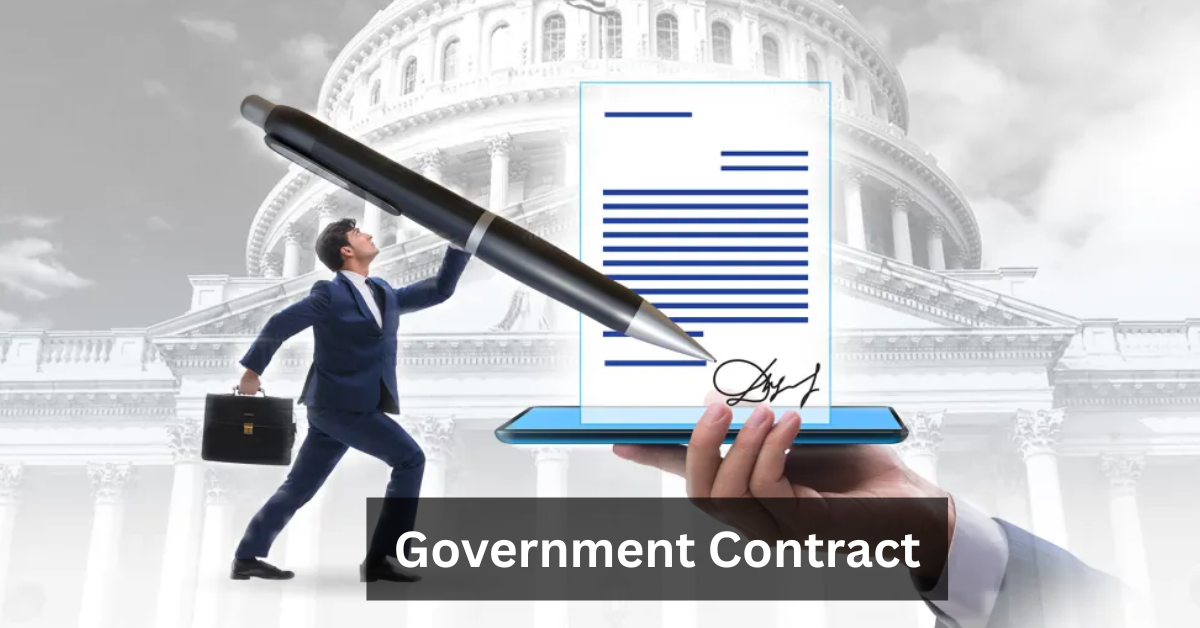There are several types, including fixed-price contracts, cost-reimbursement contracts, time and materials contracts, and IDIQ contracts. These contracts are highly sought after due to their lucrative potential and long-term stability. Federal government contracts can range from small-scale supplies to massive infrastructure projects, and businesses of all sizes can compete for them.
For businesses, securing a government contract offers not only financial rewards but also increased credibility and opportunities for growth. Given the vast scope and complexity of the government procurement process, understanding how to navigate the landscape is essential for success.
Why Pursue Government Contracts?
Securing a government contract comes with several significant benefits that can elevate a business to new heights.
Profitability
Government contracts often represent stable, long-term revenue streams. Many government projects are large in scope and can last for several years, providing consistent income. Whether it’s a fixed-price contract or a cost-reimbursement contract, businesses can count on steady cash flow and larger project scopes, which can propel their growth.
Credibility and Reputation
Winning a government contract immediately boosts a company’s credibility. Being able to showcase that your business was chosen to deliver goods or services for government agencies adds trust and recognition in the market. This can help attract new clients, partners, and investors who value reliability and competence.
Long-Term Opportunities
Government contracts often lead to more opportunities. Many contracts are awarded with the potential for renewal, or businesses may be able to bid on future projects as a result of past successful performance. Additionally, subcontracting opportunities with prime contractors provide another avenue for growth.
Types of Government Contracts Explained
There are several types of government contracts, each with distinct characteristics and structures. Understanding these contracts is essential for tailoring your approach and ensuring success in bidding.
Fixed-Price Contracts
A fixed-price contract involves the government agreeing to pay a set amount for the work or service completed, regardless of the actual costs incurred. This contract type is commonly used when the scope of work is clear and unlikely to change. While it offers certainty for both parties, it also places the risk of cost overruns on the contractor.
Cost-Reimbursement Contracts
In a cost-reimbursement contract, the government agrees to reimburse the contractor for their expenses, in addition to a predetermined fee or profit. These contracts are typically used when the scope of work is uncertain or may change over time. This contract type provides more flexibility but requires careful management to avoid exceeding budget limits.
Time and Materials Contracts
A time and materials contract is used when the government agrees to pay the contractor for the time spent on the job, plus the cost of materials. This type of contract is often employed for projects where the scope is less predictable, or the project is expected to evolve as work progresses.
Indefinite Delivery/Indefinite Quantity (IDIQ) Contracts
An IDIQ contract provides the government with flexibility by specifying only the maximum quantity of goods or services to be delivered. The government can issue task or delivery orders as needed, making it ideal for ongoing or uncertain requirements. This type of contract is beneficial for both the government and the contractor due to its adaptability.
Understanding the Federal Acquisition Regulation (FAR)
The Federal Acquisition Regulation (FAR) governs how the federal government acquires goods and services. It’s a set of rules that dictate the entire government procurement process, ensuring fairness, transparency, and consistency.
Overview of FAR and Its Importance
FAR applies to all federal contracts, providing a standardized process for awarding and managing contracts. Understanding the FAR is crucial for businesses, as it dictates everything from proposal submission to compliance requirements. The regulations ensure that businesses are treated equally and that taxpayer money is spent efficiently.
Key FAR Clauses Every Contractor Should Know
Some of the critical clauses businesses should be aware of include:
- FAR 52.212-1: Instructions to Offerors – Commercial Items
- FAR 52.232-18: Availability of Funds
- FAR 52.243-1: Changes – Fixed-Price
These clauses help businesses understand their obligations and the government’s expectations for contract execution.
Steps to Register for Government Contracting
Before pursuing government contracts, businesses must register with various systems and obtain essential certifications. These steps ensure that your company is eligible and ready to compete for contracts.
SAM.gov Registration
The first step in registering for government contracting is completing your SAM.gov registration. The System for Award Management (SAM) is the official database where the federal government verifies businesses. All contractors must be registered in SAM to do business with the government.
DUNS or UEI Number
To complete your SAM registration, you’ll need a DUNS number (Data Universal Numbering System) or a UEI (Unique Entity Identifier). This number helps identify your business in various government databases and is required for contracts and grants.
NAICS Code Identification
Your business will also need to identify its NAICS (North American Industry Classification System) code, which categorizes your business by industry. This helps the government identify the types of contracts your company is eligible for.
SBA Certification (If Applicable)
If your business qualifies, obtaining SBA certification (such as 8(a) or HUBZone) can open doors to special set-aside contracts, which are reserved for small businesses in certain categories. The U.S. Small Business Administration (SBA) offers various programs designed to help small businesses secure government contracts.
How to Find Government Contract Opportunities
Once registered, businesses must know where to find government contracting opportunities.
Platforms like SAM.gov, GSA eBuy, and GovWin
Several online platforms can help you discover government contracts. SAM.gov is the primary portal for finding federal opportunities. The General Services Administration (GSA) also offers GSA eBuy, which is a marketplace for federal buyers. Additionally, GovWin offers valuable market intelligence and a subscription-based platform for locating government contract opportunities.
Interpreting Solicitation Notices (RFQ, RFP, IFB)
When searching for contracts, businesses will encounter different types of solicitation notices:
- Request for Quotation (RFQ): Used for smaller purchases.
- Request for Proposal (RFP): Used for more complex requirements.
- Invitation for Bid (IFB): Used when price is the sole factor in selection.
Understanding how to interpret these notices ensures that businesses submit the right proposals at the right time.
Crafting a Winning Government Contract Proposal
A government contract proposal is your opportunity to showcase why your company is the best choice for a specific project. A winning proposal not only meets the solicitation requirements but also stands out from the competition.
Key Documents and Structure
Your proposal will likely need to include:
- Technical Approach: A detailed plan for how you will complete the work.
- Past Performance: Examples of successful projects.
- Pricing: A breakdown of costs, often by the type of contract.
Proposal Writing Best Practices
Write clear, concise, and compliant proposals. Avoid jargon and focus on demonstrating your ability to meet the government’s needs. Consider using AI for GovCon tools to automate parts of the process and ensure accuracy.
Common Mistakes to Avoid
One common mistake is failing to read the solicitation notice thoroughly. Always ensure that your proposal adheres to the guidelines, including formatting, pricing, and documentation requirements.
Leveraging AI Tools to Streamline Proposal Writing
AI-based tools can drastically improve the efficiency and accuracy of your government contract proposals. With AI for GovCon, businesses can automate routine tasks like data collection and document formatting. These tools can also help ensure compliance with Federal Acquisition Regulation (FAR) and other regulatory standards.
Real-world examples of AI-assisted contract wins demonstrate how these tools can enhance proposal writing, improving the chances of securing contracts in a competitive market.
Understanding Government Procurement Processes
The government procurement process can seem complex, but understanding the various stages is key to success.
Bidding Timelines and Evaluation Criteria
Government contracts typically follow strict timelines. Bidding can be highly competitive, and understanding the evaluation criteria can help businesses tailor their proposals accordingly. Contracting officers evaluate proposals based on factors such as technical merit, past performance, and price.
Award Decision-Making
The government uses a structured process to select winning bids. Contracting officers play a crucial role in this process, ensuring that all proposals are evaluated fairly and in compliance with procurement policies.
Compliance and Legal Obligations
Once awarded a contract, businesses must adhere to numerous compliance requirements.
Contract Performance Requirements
Meeting the contract performance requirements is essential for maintaining a good relationship with the government and avoiding penalties. This includes adhering to delivery schedules, quality standards, and other performance metrics.
Reporting and Auditing
Government contracts often require periodic reporting and auditing to ensure compliance. Contractors must be prepared to provide documentation and evidence of their progress throughout the contract’s life cycle.
Avoiding Disqualification
To avoid disqualification, ensure your business complies with all contract terms and conditions, including performance, reporting, and legal requirements.
Opportunities for Small and Minority-Owned Businesses
The U.S. government offers numerous opportunities for small business government contracts. Programs like 8(a), HUBZone, and WOSB set aside contracts specifically for small businesses and minority-owned businesses.
Securing a set-aside contract can provide businesses with a competitive edge, as these contracts are reserved exclusively for qualified entities.
Working as a Subcontractor Under a Prime Contractor
Working as a subcontractor under a prime contractor is a great way to get your foot in the door with government projects. As a subcontractor, you’ll have the opportunity to build a past performance record, which is essential for bidding on future contracts.
Finding Prime Contractors
There are several ways to find prime contractors willing to partner with smaller firms. Networking at industry events and utilizing platforms like GovWin are excellent strategies.
Benefits and Obligations
As a subcontractor, you’ll gain valuable experience working on government contracts while taking on less risk than the prime contractor. However, it’s essential to understand your obligations and maintain compliance with the terms of the prime contract.
Conclusion
While government contracts offer excellent opportunities, they come with their challenges. The bidding process can be competitive, and compliance requirements are stringent. However, the rewards—both in terms of profitability and credibility—make it a worthwhile venture for many businesses.
Consider your company’s strengths, the types of government contracts you’re eligible for, and your capacity to meet the procurement requirements. With the right strategy and tools, securing a government contract can be a game-changer for your business.
Frequently Asked Questions
How can I find government contracts for my business?
You can find government contracts on platforms like SAM.gov, GSA eBuy, and GovWin.
What is SAM.gov?
SAM.gov is the primary portal for businesses to register and be eligible for federal contracts.
Stay in touch to get more updates & alerts on Erome! Thank you



